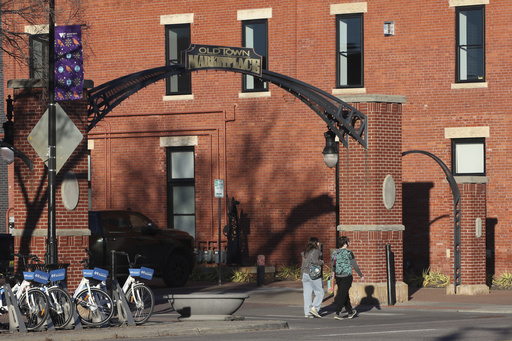WICHITA, Kan. — American Eagle Flight 5342 departed from Wichita, a city renowned for its rich aviation heritage, during a moment of pride. Just days before the flight, the city had successfully hosted the U.S. Figure Skating Championships, an event that brought together aspiring Olympic athletes and showcased Wichita on a significant national platform. The arena, which opened in 2010 with a capacity of 15,000, was intended to attract major events and bring vibrancy to the local community. However, the joyous occasion was overshadowed by the devastating news that the flight didn’t arrive at its destination.
“The pride we felt for showcasing these athletes alongside their families and friends was palpable,” expressed Mayor Lily Wu. “But ending such a remarkable week with this tragedy has completely shattered our hearts.” The tragic midair collision on Wednesday evening involved the flight and an Army helicopter in Washington, D.C., resulting in the deadliest air disaster in the U.S. in recent times. A total of 67 lives were lost, including young figure skaters who had recently participated in a national training camp in Wichita. Sadly, there were no survivors from the incident.
Wichita, with its nearly 400,000 residents, has long been intertwined with the story of American aviation and is a critical center for industries related to oil and engineering, reflecting the highs and lows of its economic cycles. It remains uncertain how many of the deceased were from the Wichita area, as authorities have not yet made public the list of passengers. Among those on board were a mix of individuals, including friends on a hunting trip, an attorney on business, and a college student returning from a family funeral.
In response to the tragedy, community and faith leaders organized a prayer vigil that drew hundreds, offering solace and support for the families affected. Rabbi Shmulik Greenberg of Chabad emphasized the importance of transforming their sorrow into a source of strength and unity. “This unity cannot just remain in sadness. It should inspire something greater, something that can illuminate our community,” he encouraged.
Wichita’s aviation industry dates back to its origins as a trading post shortly after the Civil War, followed by a brief period as a cattle town. Its significant growth occurred during the 1940s and 1950s, driven by the production of military and civilian aircraft. Travelers at Dwight D. Eisenhower National Airport, named after the former president from nearby Abilene, are greeted by displays honoring Wichita’s status as the “Air Capital of the World.”
The presence of thousands who work in the aviation sector is felt throughout the local economy, employing many in major companies such as Spirit AeroSystems and over 350 supporting suppliers. Notably, the city has also been a birthplace for iconic brands, such as White Castle and Pizza Hut, which originated from local entrepreneurs.
Recently, Wichita celebrated the inaugural year of American Airlines’ daily flight connecting the city to Washington, D.C. Bombardier, the manufacturer of the downed aircraft, has its U.S. headquarters in Wichita, and local leaders have noted the close ties the community has with the company. Jim Howell of the local county commission remarked, “There are numerous connections with the plane and Bombardier, especially since many employees here test and maintain these aircraft.”
Wichita has seen its population more than double between 1940 and 1960, leading to a continually growing and diverse community. The public school system, the state’s largest, serves about 11% of Kansas’s students and includes families representing over 100 countries and languages.
The city has faced other aviation disasters in the past, including a tragic plane crash in 1970 that claimed the lives of 31 of 37 people aboard, including members of Wichita State University’s football team. In light of the recent incident, the Wichita Community Foundation swiftly established a fund to assist the victims’ families, addressing needs for burial costs and mental health support. Foundation President and CEO Shelly Prichard noted the immediate outreach from the public eager to lend a hand.
Attendee Kristin Anneler, touched by the vigil’s spirit, expressed hope seeing people of diverse backgrounds unify in mourning. “It’s a small glimpse of humanity we often overlook, trapped in our own thoughts and routines,” she said, reflecting on the communal support displayed during such a painful time.




